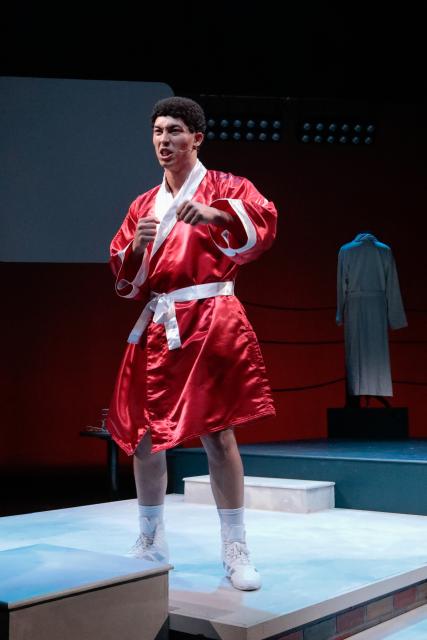

As the pandemic raged, the authors of From Birmingham to Broadway and Float Like a Butterfly took advantage of Westcoast Black Theater Troupe’s shutdown to give it a program to start up with. May 2022’s opening double bill prominently features the kind of music that’s always strongly attracted audiences to WBTT. It doesn’t disappoint.
The biographic similarities between Nell Carter and Muhammad Ali are that both were black, raised in segregated communities, felt the sting of racism relatively early in life, and had high career aspirations. Each became a success but did not escape suffering before and during its pursuit. Their stories’ highlights took place in the second half of the 1900s.
In segregated Birmingham as a teenager, Nell Carter experienced her life’s most traumatic event, a rape and resulting pregnancy (sensitively portrayed by Tarra Conner jones (sic)). Mistaken for trash by her father, who made her give her baby to an older sister, Nell left to try to use her strong voice in a career. From supper club engagements, she was determined to be on The Great White (and Thin Blond) Way, despite her having the opposite of Broadway performers’ characteristics. But jones’s Nell trusted in God whose “Eye is on the Sparrow”, though jones also sings plaintively of how often Nell felt “Black and Blue.” “On Broadway” is Tarra Conner jones’ spirited introduction to Nell Carter’s success there, with her greatest hit, a role and title song from Ain’t Misbehavin’. Other hits that follow, again by jones’ with as strong voice as Nell’s, include “Honeysuckle Rose,” “I’ve Got a Feeling I’m Falling,” “Mean to Me” (a reference also to her love life).
A spiritual “Amazing Grace” brings jones finally to Nell’s final spiritual reconciliation and ability to deal with unrequited love. She had been lucky to have a long international TV hit role in “Give Me a Break” and many individual ones afterward. So jones happily leads to Nell’s rousing claim that “This Joint Is Jumping”—which also applies very much to WBTT now.
Making excellent transitions in Nell Carter’s story are Tarra Conner jones’s various physical ups and downs and donning of different jackets and robes from clothes poles in Adam Spencer’s multi-stepped set. She also makes fine use of a vanity table. Michael Pasquini’s lighting helps assure all of her actions and important facial expressions are clearly seen.
As in so many plays I’ve witnessed concerning Black biographies, Birmingham to Broadway ends by minimalizing later-life details unlike those before it. There are a few lines about Nell Carter’s marriages and divorces, miscarriages, alcoholism, drug addition, and efforts at rehab. There’s no mention of whether or not she ever made contact with her child that Nell’s older sister took into her family. If a play is going to go only to Broadway in Carter’s life, one can understand the truncated biography, but jones’s piece takes us past a TV career that went farther to Carter’s death than it had gone forward to her Broadway success. And what about her singing after the Broadway and touring shows?
Float Like a Butterfly comes from Muhammad Ali’s famous admonition of to how win a fight and is followed by the addition, “Sting Like a Bee” and then “his hands can’t hit what his eyes can’t see.” It is the best piece of poetry to be heard in the Jacobs’ brothers’ play about Ali, which tries to make him a poet rather than mainly a rhymer and a constant rapper than an often cadenced-speaker. Actually, “Float Like a Butterfly” is—like its source—primarily a dance musical, often with lyrics matched to the music.
Happily, the dance, especially the part that has the sustained energy of Darius Autry “working out” for Ali’s pivotal fights, is thrilling modern dance and sometimes abstract ballet. It’s done to fitting regular but mostly recorded music of exceptionally good quality. It gets to the peak of perfection helped by sound designer Patrick Russini for both shows.
Since the actually played action of the play involves Ali’s early life as Cassius Clay through his conversion as Ali to the Nation of Islam and refusal to register in draft for the Viet Nam war, it is so right to have youthful Darius Autry mainly interpret this time. In the last third of the play, what dominates are the still and movie projections of Ali as designed by Jay Poppe. These cover all the draft controversy, legal action against Ali and Supreme Court decision (1971), leading to Ali’s most famous fights, notably against Joe Frazier (twice; one loss), Sonny Liston, Floyd Patterson, George Foreman.
Ali’s attempt at poetry came early, is better performed as rap musical pieces than as high quality poems. The Jacobs brothers had good sense to stress the pop music in script and direction. Ali’s early story, however, is as good as accounts get of racism, recognition of it and reaction to it by a victim of it. His failure to be served in a “White” restaurant in his home town, though he had just won an Olympic medal for boxing for America, is pivotal. From that point on, Ali had his foe outside the ring — and maybe more if the one inside seemed to stand for or cooperate with some racism on the part of fight organizers and spectators.
Here, as in Nell Carter’s story, presentation of Ali’s last days is slight. Darius Autry’s disposition does try to sustain a glorification of Ali as a man of conscience, striver for social justice, and a great boxer. One might rap “Beautiful as Butterfly Was He, Though Having Been Stung By Bee.” The music at WBTT for this story about Ali could not be more appropriate in kind and performance.
